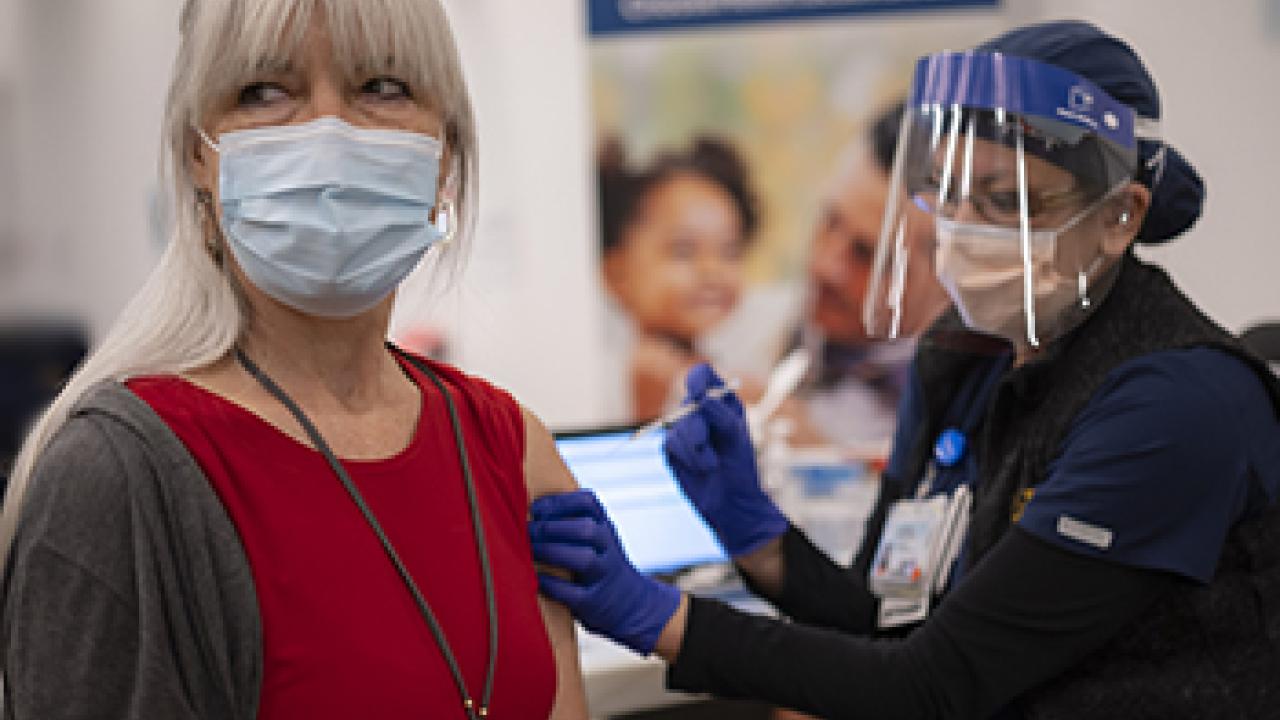
Vaccine slashed COVID-19 rates among UC Davis Medical Center employees
New study examines impact of vaccine on health care workers during winter coronavirus surge
A UC Davis Health retrospective study published recently in Infection Control and Hospital Epidemiology shows how quickly COVID-19 infections were reduced among health care workers when vaccines were first distributed late last year. Researchers examined the incidence of COVID-19 in thousands of UC Davis Medical Center employees before and after vaccines were made available.
COVID-19 infection decreased among workers from 3.2% during the eight weeks prior to vaccinations to 0.38% by four weeks after the start of vaccine administration. The case positivity rate dropped to 0.04% at two weeks after the second vaccine dose.
“As the general public was waiting to get vaccinated, we as health care workers thought it was imperative to understand the effect of COVID-19 vaccines in the health care setting in which we work,” said Sarah Waldman, lead researcher and infectious disease specialist. “It was understanding more of what the real-world impact was of COVID-19 vaccines and using that to potentially combat vaccine hesitancy.”
The data showed a single dose of either the Pfizer or Moderna vaccines, available at that time, decreased the risk of contracting COVID-19 by 48% among hospital personnel. A second dose decreased the risk by 83%.
“We found that vaccines are effective in preventing COVID-19 infection, regardless of where you work or what type of job you perform,” Waldman said. “Our findings were consistent with the Phase 3 mRNA vaccine trials for both the Pfizer vaccine and the Moderna vaccine.”
The study
“We found that vaccines are effective in preventing COVID-19 infection, regardless of where you work or what type of job you perform.”
— Sarah Waldman
The study included more than 16,000 faculty, staff, and medical and nursing students at UC Davis Medical Center. These were the employees who were eligible for the first doses of vaccine. Researchers divided workers into five main groups with varying on-the-job risk of COVID-19 exposure. They included staff in environmental and custodial services, nurses, physicians, respiratory therapists and “other,” or employees with limited patient contact, such as those in administration and information technology. The study also examined vaccination acceptance, the incidence of COVID-19 after the vaccine and hospitalization.
The review took place from October 2020 to March 2021 to include both pre- and post-vaccine time periods.
Timothy Albertson, chair of the Department of Internal Medicine and a specialist in pulmonary and critical care, was a co-author of the study. “We were particularly interested in generating data from our own institution to make people well aware of the protective background that vaccines give you against this particular COVID infection,” Albertson said.
Vaccine hesitancy
This study’s release comes as COVID-19 rates are soaring again across the country and at the UC Davis Emergency Department. Many of these patients have the highly contagious Delta variant. Most are unvaccinated. The Centers for Disease Control reports the increase in cases, hospitalizations and deaths are most prevalent in areas with low vaccination rates.
The UC Davis study found COVID-19 vaccine hesitancy varied among health care workers. “The highest acceptance of COVID-19 vaccination was among physicians and the lowest was among non-clinical health care personnel,” said Waldman. She noted that reasons for uncertainty about the vaccine are complex, ranging from concerns about unknown long-term risks and side effects, as well as distrust over the regulatory process. “As time goes by, we are constantly gathering more and more data about the safety of these vaccines. I am not sure that will change the people who are in the ‘definitely no’ category. It might convince some people who are waiting for more data.”
Vaccine mandates
The prevalence of the COVID-19 Delta variant has prompted the state of California to require health care workers to show proof of vaccination by the end of September. Some exceptions to vaccination are allowed, however unvaccinated workers will have to undergo regular testing.
Currently, more than 90% of UC Davis Health employees are fully vaccinated.
“The Delta variant has shown that getting our population vaccinated is more important than ever,” said David Lubarsky, UC Davis Health chief executive officer and a co-author of the study. “This study proves that vaccines dramatically reduce the incidence of the virus in the health care setting – and the same is true throughout our community.”